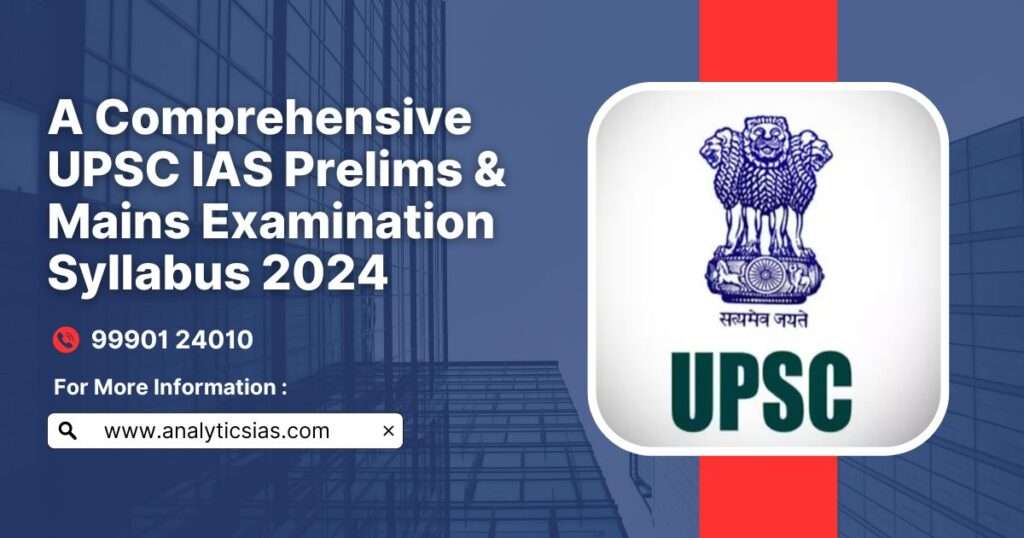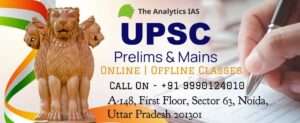Civil Service Examination UPSC Prelims and Mains Syllabus 2024
Welcome to the ultimate guide for aspirants preparing to conquer the UPSC Civil Services Examination 2024. This examination is not just a test of knowledge but a rigorous evaluation of a candidate’s understanding, analytical skills, and aptitude. With the right strategy and diligent preparation, you can navigate through the complexities of both the Preliminary and Mains stages of the examination.
Aspiring to become a civil servant in India is a noble ambition, and the UPSC (Union Public Service Commission) conducts the prestigious Civil Services Examination to select candidates for various administrative positions. The examination process is rigorous, consisting of three stages: Preliminary Examination, Main Examination, and Personality Test (Interview). In this blog, we’ll delve into the syllabus for the UPSC IAS Prelims and Mains Examination for the year 2024, providing insights and guidance for aspirants aiming to crack this coveted exam.
Here’s a concise overview of the UPSC Civil Services Examination 2024 syllabus, covering both the Preliminary and Mains stages:
UPSC Complete Syllabus 2024
Here is the complete syllabus for the UPSC Civil Service Examination 2024 and it mainly consists of three stages:
- The Preliminary Examination (also known as Civil Services Aptitude Test or CSAT)
- The Main Examination
- The Personality Test (interview)
UPSC Prelims Syllabus 2024
The Preliminary Examination acts as a screening test and it comprises two papers:
- Paper 1 – General Studies I (GS)
- Paper 2 – General Studies Paper II (CSAT)
UPSC Prelims Exam Pattern
The exam pattern for UPSC Prelims is provided in the table below:
| Exam Pattern & Syllabus For UPSC Prelims | |
|---|---|
| Two Compulsory Papers | General Studies Paper – I (GS)General Studies Paper – II (CSAT) |
| Number of Questions (GS Paper – I) | 100 |
| Number of Questions (CSAT) | 80 |
| Total Number of Marks | Total – 400 (200 each paper)GS Paper 1 – 200 MarksCSAT Paper 2- 200 Marks |
| Negative Marking | 1/3 of the total marks allotted to the question will be deducted for every wrong answer |
| Duration of Exam | Two hours for each exam: GS Paper 1 – 2hrs CSAT paper 2 – 2hrs Note:- 20 minutes per hour extra time for blind candidates & candidates with Locomotor Disability & Cerebral Palsy [minimum 40% impairment] |
| Type of Questions | Objective (MCQ) type |
| Medium of Exam | Bilingual (Hindi & English) |
UPSC Prelims Examination Syllabus
1. General Studies Paper-I Syllabus
This Paper covers a wide range of subjects, including Indian History, Geography, Polity, Economy, Science and Technology, Environment and Ecology, Current Affairs, and General Knowledge.
UPSC Prelims Syllabus Paper-1 (GS-1)
- Current events of national and international importance
- Indian and World Geography: Physical, Social, and Economic Geography of India and the World
- Indian and World Geography (Physical, Economic Geography of India & the World)
- History of India and the Indian National Movement
- Economic & Social Development
- General Issues on Environmental Ecology, Biodiversity, and Climate Change
- General Science
2. General Studies Paper-II Syllabus (CSAT)
This paper evaluates candidates’ aptitude in areas such as Comprehension, Logical Reasoning, Analytical Ability, Interpersonal Skills, Decision Making, and Problem-Solving.
UPSC Prelims Syllabus Paper-2 (CSAT)
- Interpersonal skills including communication skills
- Decision-making and problem-solving
- Comprehension
- General mental ability
- Logical reasoning and analytical ability
- Basic numeracy
UPSC Civil Services Mains Examination 2024
The Main Examination is the most crucial stage and tests candidates’ in-depth knowledge of various subjects. It consists of nine papers, which can be categorized as follows:
a) Compulsory Papers: These include Essay Writing, English Language Comprehension, Precis Writing, and General Studies (four papers covering diverse topics such as Indian Heritage and Culture, Governance, International Relations, Ethics, and Integrity).
b) Optional Papers: Candidates need to choose two optional subjects from a list of available disciplines, such as History, Geography, Public Administration, Political Science, Economics, Sociology, and more.
UPSC Mains Exam Pattern
| Paper | Subject | Marks |
|---|---|---|
| Paper – I | Essay | 250 |
| Paper – II | General Studies – I (Indian Heritage & Culture, History & Geography of the World & Society) | 250 |
| Paper – III | General Studies – II (Governance, Constitution, Polity, Social Justice & International Relations) | 250 |
| Paper – IV | General Studies – III (Technology, Economic Development, Biodiversity, Security & Disaster Management) | 250 |
| Paper – V | General Studies – IV (Ethics, Integrity & Aptitude) | 250 |
| Paper – VI | Optional Subject – Paper I | 250 |
| Paper- VIII | Optional Subject – Paper II | 250 |
UPSC Mains Examination Syllabus
Qualifying Papers on Indian Languages and English
English Language:
- Comprehension of given passages.
- Precise Writing.
- Usage and Vocabulary.
- Short Essays.
Indian Languages:
- Comprehension of given passages.
- Precise Writing.
- Usage and Vocabulary.
- Short Essays.
- Translation from English to the Indian Language and vice-versa.
Detailed Mains Papers Syllabus 2024
Here is the detailed syllabus for the UPSC Mains Examination 2024:
Paper 1: Essay (250 Marks)
- Candidates will be required to write an essay on one of the following topics:
- Indian Heritage and Culture
- History and Geography of the World and Society
- Social Justice, Polity, Constitution, Governance, and International Relations
- Economic Development, Technology, Environment, Biodiversity, Security, and Disaster Management
- Ethics, Integrity, and Aptitude
Paper 2: General Studies I (250 Marks)
- Indian Heritage and Culture
- Sources, historical development, salient features, and major trends in Indian art, architecture, literature, music, dance, and sculpture from ancient to modern times.
- Philosophical and religious movements, their impact on society and culture, and contribution to the national identity.
- Important aspects of Indian culture, such as festivals, fairs, and folk arts and traditions.
- History and Geography of the World and Society
- Major trends in world history, with focus on Europe, Asia, Africa, and the Americas.
- Important geographical aspects of the world, such as physical features, climate, natural resources, and human development.
- Major political and economic events of the world, with focus on the Cold War and the post-Cold War era.
Paper 3: General Studies II (250 Marks)
- Polity, Governance, Constitution, Social Justice, and International Relations
- The Indian Constitution: basic structures, features, modifications, major provisions, and historical context.
- Functions and duties of the Union and the States, problems and difficulties with the federal system, and obstacles with the devolution of authority and resources to local levels.
- Issues relating to the Indian State, such as secularism, socialism, federalism, and good governance.
- Social justice and the empowerment of weaker sections of society, such as women, children, the disabled, and the marginalized.
- India’s foreign policy, its role in international relations, and its relations with neighboring countries and important world powers.
Paper 4: General Studies III (250 Marks)
- Economic Development, Technology, Environment, Biodiversity, Security, and Disaster Management
- Economic and social development: theories, policies, and strategies.
- Development experiences of India and other countries.
- Science and technology: developments and their applications and effects in everyday life.
- Achievements of Indians in science & technology; indigenization of technology and developing new technology.
- Environmental issues, such as deforestation, pollution, and climate change.
- Disaster management: principles, approaches, and mechanisms.
Paper 5: General Studies IV (250 Marks)
- Ethics, Integrity, and Aptitude
- Ethics and moral values.
- Integrity and its importance in public life.
- Aptitude for critical thinking, problem-solving, and decision-making.
- Understanding the implications of government policies and programs.
- Awareness of current social, economic, and political issues.
Paper 6 and 7: Optional Subjects (250 Marks Each)
- Candidates have to choose two optional subjects from a list of 23 subjects. The syllabus for each optional subject is given on the UPSC website.
UPSC Optional Subjects List
The list provided in the table below shows the optional subjects for UPSC:
| UPSC Optional Subjects List | |
|---|---|
| Agriculture | Philosophy |
| Animal Husbandry and Veterinary Science | Physics |
| Anthropology | Political Science & International Relations |
| Botany | Psychology |
| Chemistry | Public Administration |
| Civil Engineering | Sociology |
| Commerce & Accountancy | Statistics |
| Economics | Zoology |
| Electrical Engineering | Mathematics |
| Geography | Mechanical Engineering |
| Geology | Medical Science |
| History | Management |
| Law | |
UPSC Personality Test (Final Interview)
- Purpose:
- The interview aims to assess the candidate’s suitability for civil services, including their personality traits, communication skills, and overall demeanor.
- Format:
- The interview is conducted by a panel of experts.
- It usually lasts around 30 minutes to an hour.
- Questions cover a wide range of topics, including current affairs, general knowledge, ethics, and the candidate’s background.
- Assessment Criteria:
- The panel evaluates:
- Clarity of thought
- Analytical ability
- Problem-solving skills
- Emotional intelligence
- Integrity and ethical values
- Confidence and composure
- The panel evaluates:
- Preparation Tips:
- Stay updated on current affairs.
- Be well-versed with your optional subject and DAF (Detailed Application Form).
- Practice mock interviews to improve your communication skills.
- Stay calm and composed during the interview.
Conclusion: Preparing for the UPSC IAS Prelims and Mains Examination demands dedication, perseverance, and a comprehensive understanding of the syllabus. Aspirants must meticulously cover each topic mentioned in the syllabus, along with regular practice and revision. With strategic planning and consistent efforts, cracking the UPSC Civil Services Examination and realizing the dream of becoming an IAS officer is indeed achievable. Stay focused, stay motivated, and embark on this transformative journey with confidence.



